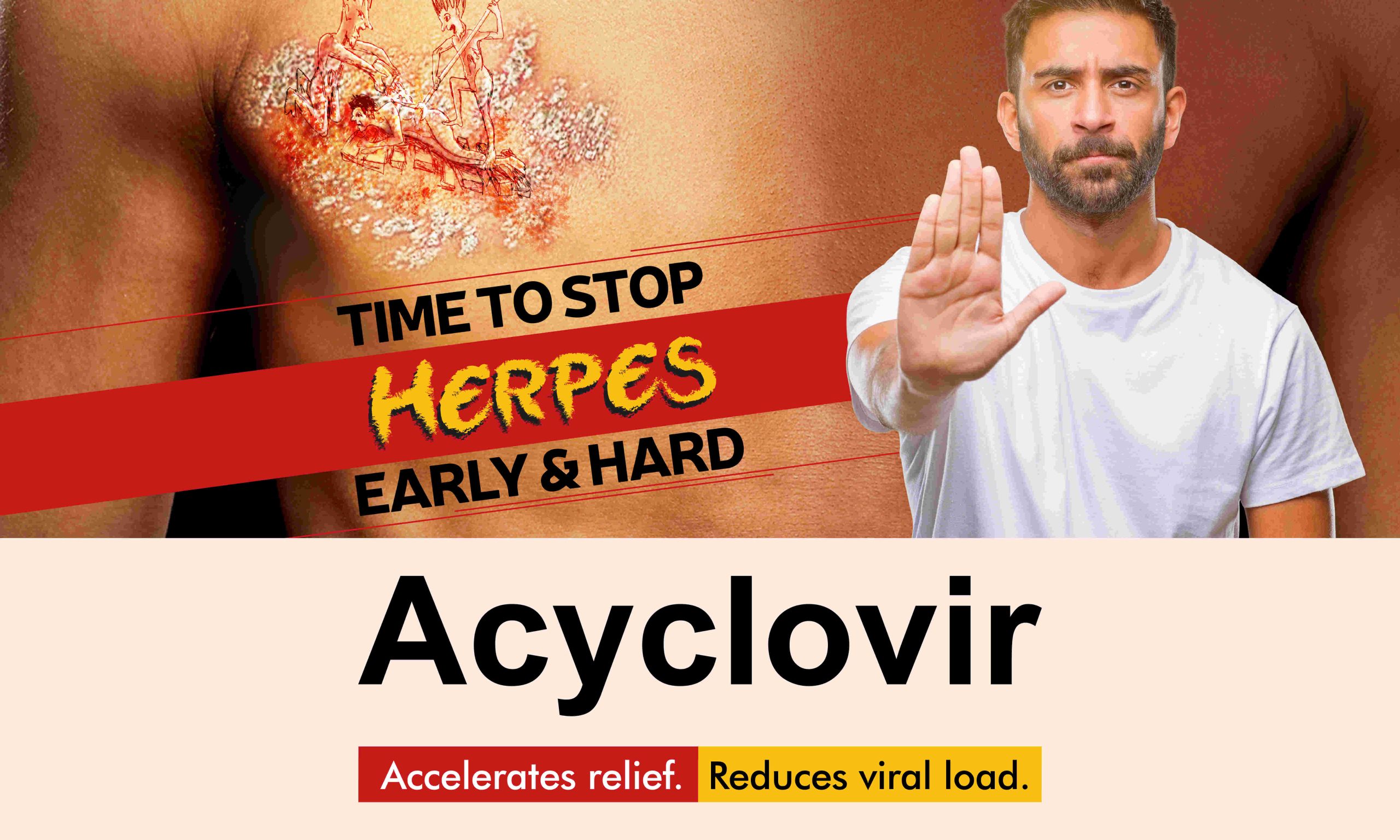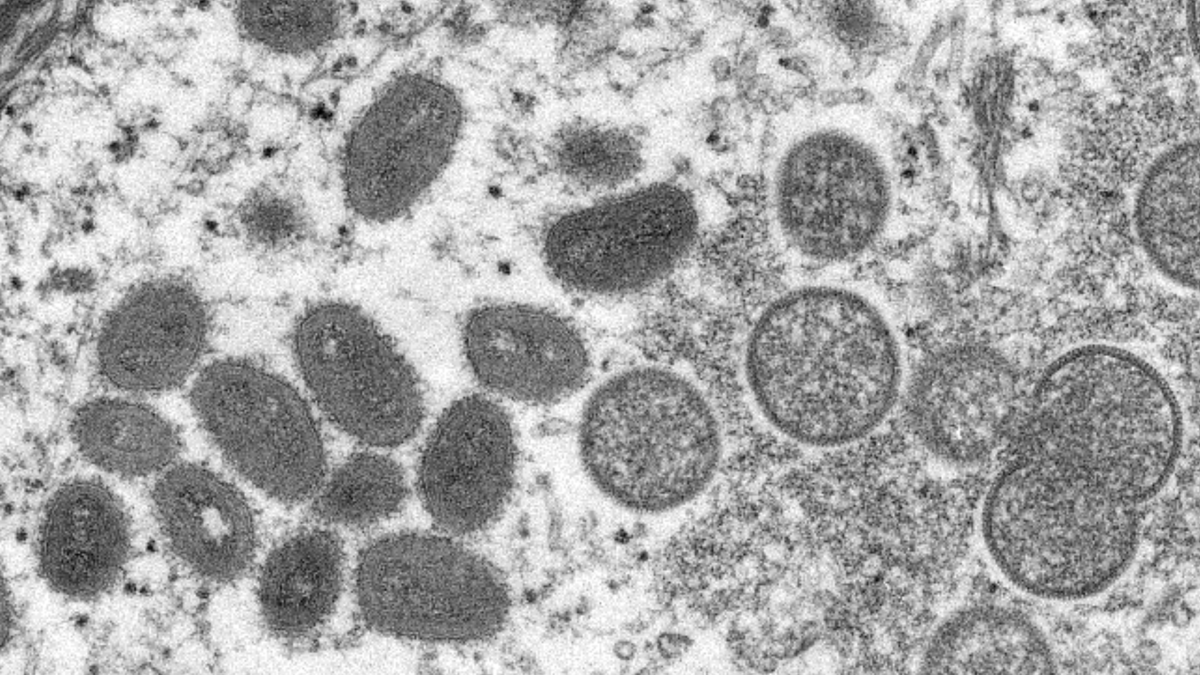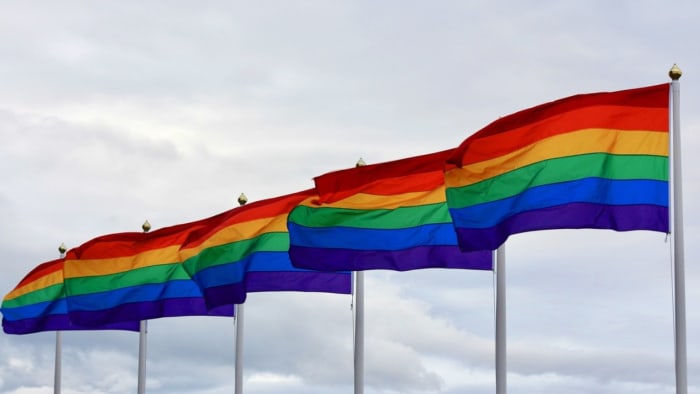Genital herpes, caused by Herpes Simplex Virus (HSV) infection, is one of the most common sexually transmitted diseases (STDs) in the world, affecting around 400 million people. There are two kinds of HSV viruses- HSV-I & HSV-II.
The HSV II virus was previously considered more commonly associated with genital herpes; however, in recent years, an increasing association between HSV-I and genital lesions has been observed. (1) The prevalence of genital herpes among sexually transmitted diseases (STD) in India is estimated up to 27.9%. Due to the recurrent nature of the disease, significant morbidity, and associated psychosocial effects, effective management of genital herpes is of public health importance. (2)
Genital Herpes – Clinical Spectrum & Treatment Overview-
The incubation time for genital HSV ranges from 1 to 12 days. Many individuals may develop noticeable signs and symptoms during initial infection, such as bilateral lesions, regional lymphadenopathy, headache, fever, malaise, and other symptoms. Primary infection might be moderate or completely asymptomatic. As high as 70%-90% of patients report recurrences in the first year, which are frequently unilateral. (3)
Acyclovir, famciclovir, and valacyclovir are approved antiviral drugs for treating genital herpes. Out of these, Acyclovir is the most commonly used medication for treating genital herpes. (2) It is the first-line drug for treating herpetic-encephalitis too. This article aims to review Acyclovir’s significance in managing genital herpes.
Acyclovir: Unique Clinical Pharmacological Profile
Acyclovir is phosphorylated to its monophosphate form by the enzyme thymidine kinase enzyme in the HSV virus. Acyclovir monophosphate is phosphorylated further to diphosphate, and triphosphate forms by cellular enzymes in the infected host cell. Acyclovir triphosphate combines with the DNA polymerase of the virus and inactivates it. In addition, Acyclovir gets incorporated into the growing DNA viral chain and causes its termination. Thus, Acyclovir inhibits the viral replication process with little to no effect on the routine, uninfected cell process and replication. (4)
Kidneys mainly eliminate Acyclovir through glomerular filtration and renal tubular secretion. It has dose-dependent kinetics. Around 75% to 80% of the total body clearance is through the renal route. (5)Depending on the patient’s creatinine clearance, Acyclovir has a half-life of 2 ½ and 3 hours. It is well distributed throughout the body and is not substantially metabolised. Radio-labelled drug metabolism studies have shown that 90% to 92% of Acyclovir is excreted unchanged. (4)
Application of Acyclovir Therapy: A physician’s Guide
In patients with genital herpes, the primary episodes are effectively treated with antiviral drugs taken within 72 hours of the appearance of the lesion. For decades, an oral and intravenous form of Acyclovir has been employed for shortening the course of primary genital herpes lesions. (6)The oral route is the most convenient and practical option for immunocompetent patients. However, with the current dosing regimen, it becomes necessary that the drug be taken orally 3-5 times daily for 7 to 10 days in the first episode and five days in recurrent episodes. (2,7)Taking the drug five times a day may be inconvenient for the patient and interfere with treatment adherence. A convenient solution for this challenge would be to prescribe an alternative regimen of a higher amount of the drug that could be administrated less frequently for a shorter time. (2)The effectiveness of the shorter therapy would not be compromised as the viral replication is maximal within the first 24 hours. In addition, this could be a cost-effective alternative and hold practical relevance in low-income countries like India. (2)Acyclovir significantly reduces viral shedding, hastens the healing of the lesion, and decreases the incidence of a new lesion. It further shortens the symptoms of discomfort and pain associated with the lesions. (6)
Study Testimonials:
Review of Clinical Evidence
Episodic therapy-
Acyclovir- 3 Days Short Course in Indian Patients: A study by Kaushal K. Verma et al. assessed the efficacy and safety of oral Acyclovir 1 g twice daily for three days in genital herpes among Indian patients. Oral Acyclovir 1 g was given to the patients twice a day for three days and followed up after days 3, 5, 7, and 10 to determine the response to therapy. The response was assessed by physicians’ assessment of the percentage healing of the ulcer and mean healing time, as well as patients’ evaluation of improvement in the Visual Analog Scale (VAS). The results revealed complete healing of ulcers in 40.9%,77.27%, and 90.90% of patients after days 3, 5, and 7 following the treatment, respectively, with a mean healing time of 4.91 ± 2.16 days. The mean healing time of recurrent disease was 4.67 ± 1.87 days. Complete improvement in VAS was seen in 40.9%, 95.45%, and 100% of patients after days 3, 5, and 7 following the treatment, respectively, with a mean time for complete improvement being 4.27 ± 1.16 days. There were no significant side effects of therapy. The team affirmed that 1 mg of Acyclovir given twice daily for three days effectively heals genital herpes lesions and offers patients a comparable healing time and convenient dosage schedule. (2)Acyclovir- Short Course Therapies: Global research investigating the efficacy of different doses of Acyclovir against a placebo or the standard acyclovir regimen has arrived at a similar conclusion. In patients with recurrent genital herpes, Goldberg et al. showed that oral Acyclovir 800 mg twice a day for five days was equally efficacious and safe as Acyclovir 200 mg five times daily for five days. Wald et al. utilised 800 mg three times daily oral Acyclovir for two days in 84 individuals with recurrent genital herpes. They found it to decrease the length of episodes and virus shedding compared to a placebo. (2)
Suppressive therapy-
In cases where recurrent genital herpes is common (> six recurrences in 1 year), severe, unpleasant, or coupled with distressing prodromes, suppressive treatment is advised. Studies document that patients with repeated recurrences have a better quality of life when they receive suppressive therapy rather than episodic treatment. In one research, 72% of patients preferred suppressive treatment to episodic therapy. Long-term suppression has diminished clinical outbreaks and subclinical shedding by 80% and 95%, respectively. (8)
Dosage Recommendations Of Acyclovir For Treatment Of Genital Herpes
For immunocompetent patients (9)-
For those experiencing the first episode of infection with mild to moderate severity, 400 mg oral Acyclovir is recommended to be taken three times daily for 7 to 10 days.In the first episode of infection with severe intensity, 5 to 10 mg/kg IV acyclovir every 8 hours for ten days is recommended.In recurring infections, either 400 mg oral Acyclovir thrice daily for five days or 800mg oral Acyclovir twice daily for five days is prescribed.
For immunocompromised patients (9)-
For those experiencing an initial episode, 400 mg of oral Acyclovir thrice daily for 5 to 10 days is recommended.In cases of recurring infections, 400 mg oral Acyclovir thrice daily or 800 mg oral acyclovir twice daily could be recommended for five days.
Acyclovir is generally well tolerated. The only absolute contraindication is hypersensitivity to the drug. It should be used cautiously in immunocompromised patients and those suffering from renal failure and hemolytic uremic syndrome. (9)
Key pointers-
Genital herpes is a common sexually transmitted disease with a prevalence estimated up to 27.9 % in India. Acyclovir, an antiviral drug, effectively treats genital herpes lesions. In relieving the symptoms, reducing the viral load, and accelerating the healing time, it also helps reduce the recurrence rate of genital herpes.Acyclovir 1 g twice a day for three days is an effective treatment for genital herpes with the advantages of comparable healing time and a convenient dosage schedule. It is a well-tolerated drug and can be prescribed safely to otherwise healthy patients.
References
1. Groves MJ. Genital herpes: A review. Am Fam Physician [Internet]. 2016 [cited 2023 Jan 11];93(11):928–34. Available from: https://www.aafp.org/pubs/afp/issues/2016/0601/p928.html
2. Verma KK, Sonune M, Dar L, Bhari N, Jangid BL. Effectiveness and safety of oral acyclovir 1 g twice a day for three days in the management of genital herpes. Indian J Sex Transm Dis AIDS [Internet]. 2021;42(1):46–9. Available from: http://dx.doi.org/10.4103/ijstd.IJSTD_111_16
3. Nag, S., Sengupta, M., Sarkar, S., Ray, Y., Chattopadhyay, D., & Sengupta, M. (2021). Isolation, characterization and acyclovir susceptibility of herpes simplex virus isolates among immunocompromised patients. Indian Journal of Sexually Transmitted Diseases and AIDS, 42(1), 19-23. https://doi.org/10.4103/ijstd.IJSTD_60_17
4. King DH. History, pharmacokinetics, and pharmacology of acyclovir. J Am Acad Dermatol [Internet]. 1988;18(1 Pt 2):176–9. Available from: http://dx.doi.org/10.1016/s0190-9622(88)70022-5
5. Laskin, O.L. Clinical Pharmacokinetics of Acyclovir. Clin Pharmacokinet 8, 187–201 (1983). https://doi.org/10.2165/00003088-198308030-00001
6. Cernik C, Gallina K, Brodell RT. The treatment of herpes simplex infections: an evidence-based review. Arch Intern Med [Internet]. 2008 [cited 2023 Jan 12];168(11):1137–44. Available from: https://jamanetwork.com/journals/jamainternalmedicine/fullarticle/414294
7. Krusinski P. A. (1988). Treatment of mucocutaneous herpes simplex infections with acyclovir. Journal of the American Academy of Dermatology, 18(1 Pt 2), 179–181. https://doi.org/10.1016/s0190-9622(88)70023-7
8. Nath AK, Thappa DM. Newer trends in the management of genital herpes. Indian J Dermatol Venereol Leprol 2009;75:566-574
9. Taylor M, Gerriets V. Acyclovir. In: StatPearls [Internet]. StatPearls Publishing; 2022.
Discovered on: 2023-05-01 06:42:22
Source: Managing Genital Herpes with Acyclovir- An Indian Experience



